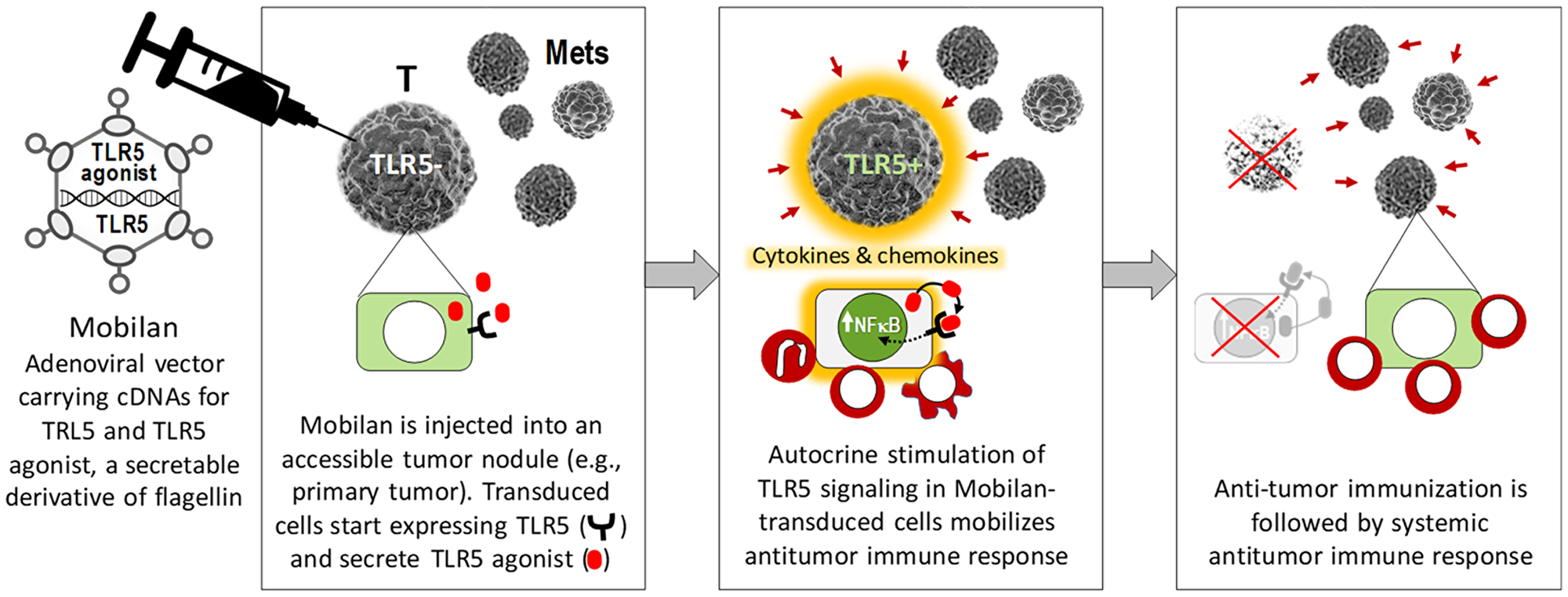Oncotarget Volume 11 Issue 14 reported that in mice, Mobilan injection into prostate tumors resulted in autocrine TLR5 signaling, immune system activation, and suppression of tumor growth and metastasis.
Here the Research Team reports a first-in-human placebo-controlled clinical study of Mobilan aimed at evaluating safety, tolerability, pharmacokinetics, and pharmacodynamics of a single intra-prostate injection of Mobilan in early-stage prostate cancer patients.
Dr. Vasily I. Kazey from Panacela Labs LLC, Moscow, Russian Federation and Andrei V. Gudkov from the Department of Cell Stress Biology, Roswell Park Comprehensive Cancer Center, Buffalo, NY, USA said "Prostate cancer (PC) is the fourth most common type of malignant neoplasm in the world, being surpassed only by breast, lung and colorectal cancers. In men, only lung cancer is more prevalent."
"Prostate cancer (PC) is the fourth most common type of malignant neoplasm in the world, being surpassed only by breast, lung and colorectal cancers. In men, only lung cancer is more prevalent."
- Dr. Vasily I. Kazey, Panacela Labs LLC & Andrei V. Gudkov from the Department of Cell Stress Biology, Roswell Park Comprehensive Cancer Center
In general, immunotherapeutic strategies are designed to combat cancer either by externally stimulating the immune system to modulate its response to tumor cells or by inducing presentation of exogenous tumor-specific antigens to the immune system.
Data obtained over the past several decades confirm that targeted modification of immune responses can lead to the destruction of tumor cells and improve the survival rate of cancer patients.
In particular, TLR5 recognizes the bacterial flagellin protein and is expressed on the surface on a variety of immune cells, including monocytes, macrophages, neutrophils, lymphocytes, NK cells, and dendritic cells.

Figure 1: Schematic illustration of the mechanism of action of Mobilan resulting in activation of antitumor immune responses.
Activation of TLRs enhances the capacity of dendritic cells to capture antigens from the environment, which are then presented to T cells upon interaction between the innate and adaptive immunity systems.
Infection of tumor cells with Mobilan results in constitutive autocrine/paracrine stimulation of the TLR5 signaling pathway, which leads to the induction of an innate immune response followed by the development of an adaptive antitumor immune response.
The Kazey/Gudkov Research Team concluded in their Oncotarget Research Article, "the results of this first-in-human clinical trial provide strong support for further development of Mobilan as a PC treatment. This addresses the critical need for new anticancer drugs that persists despite our improved understanding of the mechanisms controlling development and progression of malignant neoplasms. New strategies are needed to overcome the issues of tumor cells' acquisition of resistance to therapy and tolerance to the body's immune system as well as the high toxicity of many existing anticancer drugs that limits their therapeutic effects within permissible dose ranges. Key advantages of Mobilan over existing PC solutions (e. g., hormone therapy and cytostatic systemic chemotherapy) are:
- (i) local delivery via 1–2 injections vs. systemic treatment involving multiple doses,
- (ii) a favorable toxicity profile, and
- (iii) the possibility of targeting both hormone-dependent and hormone-resistant cancer.
Moreover, the mechanism of action of Mobilan suggests that it may have synergistic effects when administered in conjunction with existing anticancer drugs, particularly immune checkpoint inhibitors such as PD-1 inhibitors (Opdivo, Keytruda) or CTLA-4 inhibitors (Yervoy). Further study of such combinations in preclinical models of PC or other cancers may lead to expansion of the potential therapeutic applications of Mobilan."
Sign up for free Altmetric alerts about this article
DOI - https://doi.org/10.18632/oncotarget.27549
Full text - https://www.oncotarget.com/article/27549/text/
Correspondence to - Vasily I. Kazey - [email protected] and Andrei V. Gudkov - [email protected]
Keywords - prostate cancer, immunotherapy, mobilan, adenoviral vector, intratumor injection
About Oncotarget
Oncotarget is a biweekly, peer-reviewed, open access biomedical journal covering research on all aspects of oncology.
To learn more about Oncotarget, please visit https://www.oncotarget.com or connect with:
SoundCloud - https://soundcloud.com/oncotarget
Facebook - https://www.facebook.com/Oncotarget/
Twitter - https://twitter.com/oncotarget
LinkedIn - https://www.linkedin.com/company/oncotarget
Pinterest - https://www.pinterest.com/oncotarget/
Reddit - https://www.reddit.com/user/Oncotarget/
Oncotarget is published by Impact Journals, LLC please visit http://www.ImpactJournals.com or connect with @ImpactJrnls
Media Contact
[email protected]
18009220957x105




